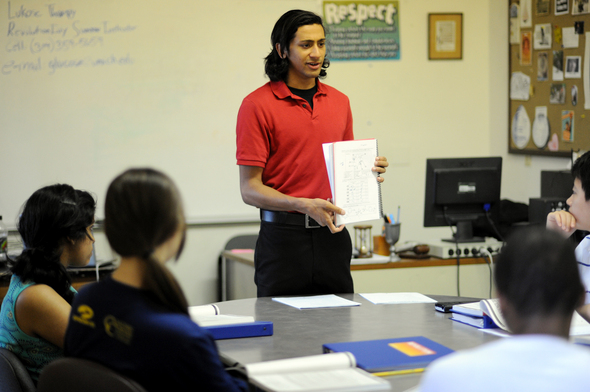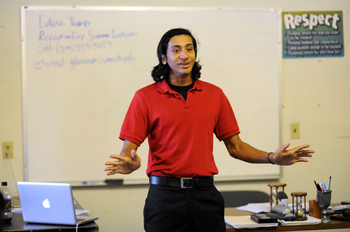U-M student's summer 'internship': offering ACT college entrance test preparation to those in need

Melanie Maxwell for AnnArbor.com
“I offer ACT prep courses to kids who maybe can’t pay or only pay so much,” Thampy said. “It’s a great experience, and at the same time I’m building my business skills.”
The prep course Thampy teaches comes from a program called Ivy Insiders. A division of Revolution Test Prep, Ivy Insiders gives college students the ability to create summer “franchises” of their test-prep centers.
Revolution gives the students teaching materials and training, but how they put it to use is up to the individual.
“This was an opportunity to basically start my own business from scratch,” Thampy said. “Ivy Insiders helps with the content, but it’s up to me to fill the classroom.”
Thampy’s original plan was to recruit students from the Ann Arbor Public Schools, but after visiting Ypsilanti High School, he decided to take a different approach.
“It wasn’t a planned thing. As I went to all of the high schools to recruit I realized that there is a great disparity between Ypsilanti and Pioneer or Huron. There’s an education gap,” Thampy said. “I started changing my marketing to kids who might otherwise not have been have been able to afford this kind of program.”
Thampy now teaches a course marketed by Revolution Prep as a $600 program to about 20 students, none of whom are paying the full price, he says.
“I worked out a lower cost payment because my husband is in construction and has not had as much work,” said Tammie Cade, the mother of one of Thampy’s students. She said she was worried that her son would not have been able to take the course had Thampy not agreed to a reduced fee.
Cade also said that her son had responded well to Thampy’s instruction.

Ivy Insiders recruits students with high standardized test scores from across the country to build franchises and teach summer courses.
Melanie Maxwell for AnnArbor.com
Derek Briggs, the chair of the Research and Evaluation Methodology Program at the University of Colorado in Boulder, authored a study published by the National Association for College Admissions Counseling. It found that commercial coaching generally has a small positive impact on SAT test scores.
Briggs said in an email that studies of SAT test scores have shown that coaching does not always improve scores, especially for lower socio-economic students.
“It does not appear to be the case that test prep is more effective for low socio-economic status (SES) kids. If anything, the opposite seems to be the case,” he said. “
"A caveat to this is that it may be the case that the commercial test prep to which low SES kids are exposed is simply lower quality than the test prep received by higher SES kids—the idea would be you get what you pay for and the rich kids can pay for higher quality.”
Thampy, however, believes that the ACT is a different type of test, and that students who have not been exposed to it can benefit strongly from “teaching to the test.”
“The ACT can be confusing because there might be multiple answers that are right, and you have to choose the one that is ‘most’ right,” he said. “You are doing an injustice to students if you don’t teach to the test as much as you can.”
Thampy said he believes his teaching will improve students' test scores because they display ability to answer some of the harder questions correctly, but often miss easier questions because of poor test-taking strategies.
The Ivy Insiders program usually encourages participants to maximize profits, but Thampy says they also give bonuses to college students who choose to work in areas where they will not be making as much money.
“In terms of improving a student’s ACT score by 4 or 5 points, or even 2 or 3, that could be the difference between a community college and a state university,” Thampy said. “Seeing that improvement outweighs the loss of revenue. As a teacher, and as a person, you feel some personal profit there.”
The students meet twice a week for class at Ann Arbor Open; Thampy also tutors in smaller group and individual sessions.
“The real key is to get the student to attend as many classes as possible, and to work as personally as possible,” Thampy said. “I never do a class for free, because the student is more likely to miss class. I set a minimum amount so the student can’t think that he is ‘hustling’ me or his parents by not showing up. He’s only hustling himself.”
Ben Freed is a summer intern at AnnArbor.com. You can reach him by email at benfreed@annarbor.com or by phone at (734)-623-4674. Follow him on Twitter @BFreedInA2.

